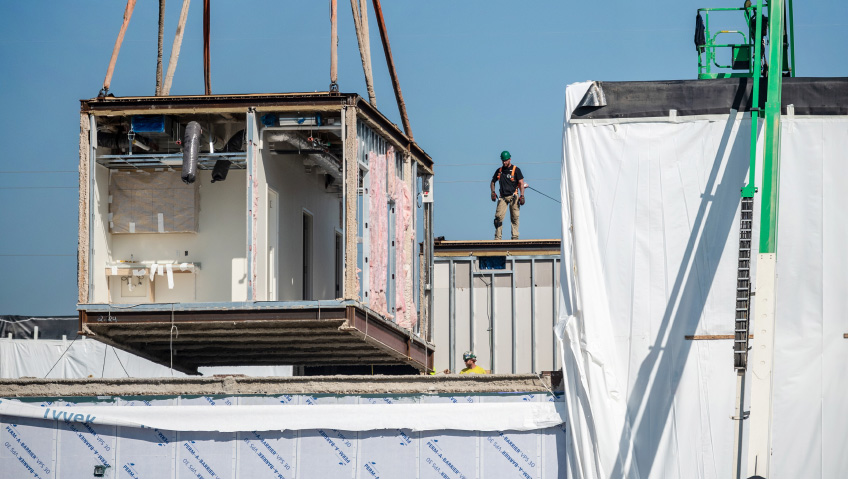Bassi Construction Ltd. marked its sixtieth anniversary this year with a new focus on converting buildings to residential use and a renewed commitment to technology and health and safety. Profiled in June 2022 in Construction in Focus magazine, this vertically integrated firm, based in Ottawa, Ontario, offers start-to-finish construction services.
“One of the new and emerging markets that we’re focusing on is the conversion of former commercial and government spaces into residential spaces,” states Health and Safety Manager Scott Jenkins.
The company has also been increasing staffing. “We’re looking at hiring project coordinators especially. We’re working with local colleges and universities to bring in co-op students, and we’re seeing a lot of international students with great experience in their countries that we’re trying to fold into Canadian construction culture,” Jenkins continues.
Bassi maintains three divisions: tenant fit-up and renovations; building restoration; and environmental services and disaster recovery. The tenant fit-up and renovations division handles construction management and general contracting, with everything from budgeting and scheduling to site and risk management and design/build. The building restoration division performs masonry, caulking, concrete forming, finishing, placing, structural repairs, cladding restoration, and waterproofing. The environmental services and disaster recovery division, meanwhile, deals with drain backups, burst pipes, floods, water-damaged floors, and mould infestations, and works closely with insurance companies. This branch can also provide demolition and rebuild services, air duct cleaning and emergency roof repairs.
The company primarily works on projects in Eastern Ontario with occasional forays into Quebec, and the commercial, institutional, and residential sectors bring in the most revenue at present.
Bassi strongly emphasizes quality workmanship and the well-being of its staff. New hires are put through a comprehensive company orientation that includes a review of health and safety rules. Once they get to a worksite, new employees receive a follow-up orientation led by the site supervisor, who points out hazards and provides more information. Frontline workers are given the personal protective equipment they require to work safely.
The company has embraced the precepts of the Certificate of Recognition (COR) program, as set by the Infrastructure Health and Safety Association (IHSA), an Ontario organization. COR consists of a series of strict protocols for managing health and safety issues. Some Ontario communities require COR registration as a prerequisite for construction companies applying for municipal contracts.
COR is “a multi-year endeavour,” says Jenkins. “We want to get as close to right as possible on the first try because failure is an option but it’s not an option we want to explore. There are requirements for external audits, and we want to be prepared so when we get to those audits, we pass with flying colours. So we’re taking our time with the development of our program, and we brought on some new staff to assist in the development,” he shares.
As Health and Safety Manager, his role “first and foremost, is the protection of the worker and to ensure that everyone on every work site goes home safely every single day. My second priority is to protect Bassi, as an employer, from risk associated with health and safety and ensure a robust and comprehensive health and safety management system is in place.”
Bassi Construction has adopted “industry best practices from a variety of organizations, partners, and industry professionals,” to create training protocols for topics such as ladder, scaffolding, heavy equipment operation, and electrical tool safety, he adds. Workers are bonded for $50 million through HUB International, a leading insurance brokerage, and the company has certification from the Institute of Inspection, Cleaning, and Restoration (IICRC), a Vancouver non-profit that sets standards for industry.
This dedication to safety, certification, and quality is central to the company’s enduring success. The company traces its origins to Mario Bassi, who immigrated to Canada in the late 1950s and took work as a mason in the Ottawa area. He founded the firm that bears his name in 1963 and it continues to thrive to this day. Then as now, Bassi Construction adheres to a customer-first philosophy.
“It’s all about serving the clients in the best way possible to ensure they are satisfied not only with the end results but the project delivery as well,” Jenkins explains. “When you’re committed to working with your clients in that way, you can build strong relationships with them. It gets to the point where clients will call directly instead of going out to tender because they know they can trust the Bassi name.”
Keeping ahead of the curve has also been instrumental to the company’s success. As Jenkins notes, technology is having a huge impact on the construction sector.
“What we’re seeing is the elimination of paper from the workplace. This is a trend you saw in IT environments years ago, but it’s [now] being implemented in construction. Everything from timekeeping and employee time sheets to safety documentation is going digital. We’re seeing a lot of tool and equipment manufacturers providing apps that pair to equipment in the field.”
The Operations Manager, for example, can log onto an app that provides live performance metrics for equipment at worksites. Similarly, the company affixes QR codes to its equipment to streamline inspections. Someone performing a daily equipment review does not have to “chase down a paper of paper to go through the inspection. Now they’re able to lock into a piece of equipment, scan a code with their phone, and it takes them right to the form. They fill it out and it’s filed right away,” explains Jenkins.
Inspection reports and live updates are transmitted directly to him, among other company officials, which makes it easier to monitor and enforce health and safety regulations. “If I identify gaps or deficiencies as the day is progressing, I know specifically who I have to call or target and get [the situation] rectified right away,” he says.
Of course, COVID continues to have a lingering impact. While the firm no longer employs the controls it put in place at the start of the pandemic, it follows COVID protocols on job sites if the customer so requests, and the pandemic has made itself felt in other ways as well. “In terms of supply chain, obviously inflation is the big thing that has come out as a result of COVID-19. We’re experiencing inflated prices for basic goods and services we require for delivering on projects,” says Jenkins.
With summer coming, Bassi is aiming to have 150 employees in place for peak construction season. As for new hires, “We’re [flexible] in what we’re looking for. As I mentioned, we’re onboarding international students from every corner of the world. We’re all about teaching people; we want to give people the opportunity to learn and come up in their own space so they feel comfortable and confident with their abilities and skills,” Jenkins says.
Qualifications depend on the position, but in general, “We look for people that have a can-do attitude and the ability to think critically. We’re not looking for worker robots. We want people who are able to look at a situation, evaluate the best thing to do, and who know when to stop and ask questions,” he continues.
A strong team is important as the company continues to land high-profile projects. Current work includes 1600 James Naismith Drive, Ottawa, the former corporate office for TD Canada Trust. Named after the man who invented basketball, this facility is being converted into residential apartments. Bassi Construction is serving as the construction manager, “overseeing all construction activities for the entire project,” says Jenkins.
The team recently finished “a very cool project at Carleton University,” involving a student academic facility. The Carleton University Future Learning Lab is a cutting-edge space that will give students easy access to technology. The assignment involved electrical, lighting, and HVAC work, among other duties. Bassi served as the general contractor for the project.
Now that public events have resumed after COVID lockdowns, the Bassi team is making the rounds of various trade shows. They attended the Canadian Concrete Expo earlier this year and are looking to take part in the Ottawa Home and Garden Show and local renovation shows. Bassi also participated in an Algonquin College Career Fair, “which is where we scooped up some of those great co-op students we’re looking for,” states Jenkins.
Onboarding co-op students is one way Bassi is dealing with what it considers its biggest non-COVID-related challenge: “finding labour, retaining labour. We’re looking at engaging at the worker level and finding out what workers are seeking in great employers. We’re spending a lot of time and energy in making sure our workforce is happy.”
Labour issues aside, Jenkins envisions a highly productive future. “In five years, I think we’re going to be focused on doing what we already do but just getting better at it and refocusing on core services, re-establishing ourselves as the leader in the space.”






